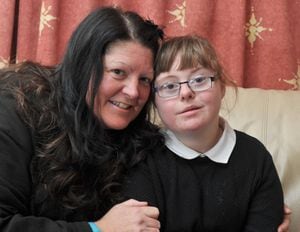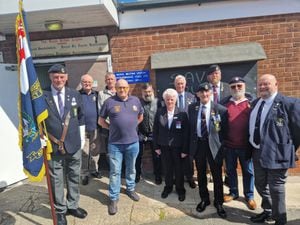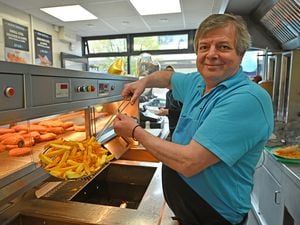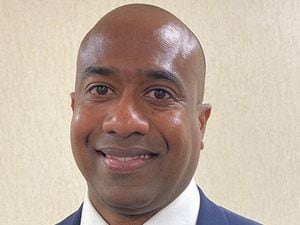Why mum Jo takes nothing for granted: A parent's experiences on World Down's Syndrome Day
When Jo Yarnall's daughter Hannah was born she knew nothing about Down’s Syndrome.

Full of uncertainty about what the future held and worried that her baby girl wouldn't be accepted by the world, at first she locked herself away.
But now the 50-year-old says she can't imagine life any other way and says every day 16-year-old Hannah helps her to appreciate life that little bit more.
"It's not the end of the world that people might think it is. Yes, it will be different to what you imagined but it's still beautiful," says mother of three Jo.
Every day two babies with Down’s syndrome will be born in the UK but this naturally occurring genetic condition is still largely misunderstood.
Most people have 23 pairs of chromosomes, but people with Down's syndrome have an extra copy of chromosome 21, which means they develop differently and have varying levels of learning disability.
Nobody knows what causes the presence of an extra chromosome but it can come from either the mother or father and occur in all races and countries around the world.
Shocked
Jo and her husband Mark didn't discover that Hannah had Down's syndrome until after she was born.
"When we found out, we were completely shocked and the bottom fell out of my world.
"We didn't know what would happen or what the future would hold for Hannah, - we still don't really, but back then we knew nothing at all.
"We had to start all of our research as soon as you she was born and 16 years ago the internet wasn't as developed as it is now so there wasn't as much information out there.
"I wanted to hide away because there was still a stigma surrounding Down's syndrome and I didn't think people would want to see me," says Jo, who also has daughters Rebecca,15, and Rachel,13 and lives in Aldridge.
Welcome to Holland
While coming to terms with the unexpected curveball life had thrown at them, Jo came across a poem written by Emily Perl Kingsley called Welcome to Holland.
"It's about going on a trip and thinking you going to Italy but you actually land in Holland. You wanted the fast-pace of Italy but you're in Holland where everything is less flashy and at a slower pace.
"But as you catch your breath and take a good look around, you realise it's not the worst place in the world. You realise Holland has lovely things too, there are tulips and windmills and Rembrandts.
"This poem really stood out to me and still makes me emotional now. There are many beautiful things in Holland to appreciate and there are with Hannah too and that's what we do," she explains.
Keen to meet other parents in the same situation, Jo set up the support group Parents, Relatives and Others Understanding Down’s Syndrome (Proud), which has members across Walsall as well as in Wolverhampton, Dudley and Cannock.
"We held a coffee morning and we had five families attend. From that we have grown to 70 families. We do fundraising so we can put on different activities and we organise a camping trip to Derbyshire. It's good to show that having a child with Down's syndrome doesn't mean life has to stop, we just carry on regardless.
"It's also about offering support on lots of different issues which might be schooling, medication or where to find the best clothes as it can be hard to find clothing that fits our children. It's about being a listening ear for each other and supporting each other," says Jo who has run marathons to help generate funds.
Enjoy
Parents may feel a range of emotions when their child is first diagnosed but Jo says the most important thing to do is to enjoy their time with their new baby.
"Enjoy the baby because they grow up too quickly. Although it might seem like the end of the world, when one door shuts, another opens into a different world and as you open your eyes more, you will appreciate things more and more.
"Children with Down's syndrome take longer to walk and eat, so all these childhood milestones aren't taken granted because you know they've worked harder to get there.
"It's seen as a bad thing and 90 per cent of pregnancies are terminated when there is a positive diagnosis for Down's which I think is very sad. It's true that it's not without it's challenges but it's the challenges that make you a better person and it makes you appreciate the smaller things in life, to appreciate friends and family and everything we normally take for granted. There are lots of beautiful things to appreciate," she adds.
Jo is keen to raise awareness and will be taking part in celebrations for World Down's Syndrome day which sees people wearing odd socks to mark the occasion. Odd socks were chosen as a symbol for the day because chromosomes are shaped like socks and those with Down's syndrome have an extra one.
In 2006 both mother and daughter appeared as extras on EastEnders after being specially invited to the set to help actors research a storyline involving characters Billy and Honey Mitchell, whose newborn baby was diagnosed with Down’s syndrome.
"They wanted to treat the storyline sensitively and for it to be an accurate portrayal of having a baby with Down's syndrome. It's an opportunity Hannah wouldn't had if she didn't have Down's syndrome," she says.
Hannah, who also has autism and cerebral palsy, attends Mary Elliot School in Walsall, and enjoys a host of hobbies including going to the cinema, swimming and trampolining, like any other teenager.
She also enjoys accompanying her mother to the weekly Park Run meeting at Walsall Arboretum in her own running buggy.
"The runners will give us high fives as we go around. Hannah is very much part of the Park Run community and her disabilities don't stop her from being accepted. She's very much accepted and touches people's lives - which is what any mother wants for a child," says Jo.
What is Down's syndrome?
Down’s syndrome is a genetic condition caused by the presence of an extra chromosome 21 in the body’s cells
Around 40,000 people in the UK have Down's syndrome and around one in 1,000 babies are born with the condition each year.
Although the chance of a baby having Down’s syndrome is higher for older mothers, more babies with Down’s syndrome are born to younger women.
Today the average life expectancy for a person with Down’s syndrome is between 50 and 60 with a small number of people living into their seventies.





